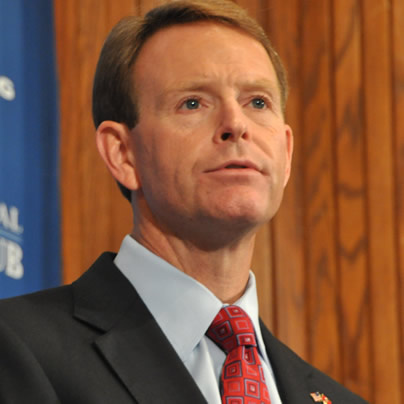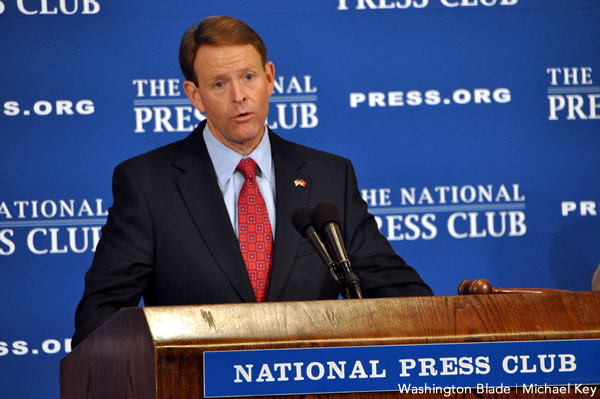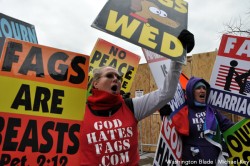National
Anti-gay groups speak out in Prop 8, DOMA briefs
‘Gov’t should not put its seal of approval on that unholy union’


The Family Research Council, headed by Tony Perkins, filed briefs in the Prop 8 and DOMA cases. (Blade file photo by Michael Key)
Anti-gay groups — ranging from the Family Research Council to the Westboro Baptish Church — filed friend-of-the-court briefs before the Supreme Court this week asking justices to uphold California’s Proposition 8 and the Defense of Marriage Act.
The briefs filed on Tuesday assert the same arguments seen repeatedly in opposition to a fundamental right to same-sex marriage, such as the inability of gay couples to procreate and the argument that being gay isn’t an immutable characteristic.
The Family Research Council, one the more prominent anti-gay groups opposed to same-sex marriage, filed briefs in both the Prop 8 and DOMA cases. In the Prop 8 brief, the group argues that the California ban on same-sex marriage isn’t discriminatory, among other reasons, because it enables any person to marry — so long as the other person is of the opposite sex.
“Proposition 8 treats men and women the same,” the brief states. “Both may marry someone of the opposite sex; neither may marry someone of the same sex.”
As Right Wing Watch points out, Family Research Council makes arguments on the political power of gays and lesbians that are contradictory. In the Prop 8 brief, the group notes that 30 states have amendments defining marriage as one man, one woman while arguing that “there is no ‘emerging awareness’ that the right to marry extends to same-sex couples.”
But in the DOMA brief, the group notes that three states voted in favor of marriage equality and Minnesota rejected an anti-gay marriage amendment to argue gay people aren’t a “politically powerless” group that need protection from discrimination.
“So when voters reject gay rights at the ballot box, they are reflecting public opinion,” concludes Right Wing Watch blogger Miranda Blue. “But when they vote in favor of gay rights, they have been ‘enlisted’ to the cause by powerful gay rights lobbyists.”
William Duncan, director of the Marriage Law Foundation, filed a brief on behalf of the National Organization for Marriage in the DOMA case, but identifies himself as a “scholar of history and related disciplines” in the Prop 8 case.
“When the People of California adopted Proposition 8, they acted to retain in their law an understanding of marriage that, until very recently, was recognized universally and without exception throughout time and across cultures,” Duncan said. “That conception of the institution of marriage has consistently been understood to advance crucial social interests in procreation, understood as the bearing and rearing of children.”
Duncan cites in his arguments a series of philosophers who’ve had an impact on American thinking, including Noah Webster and David Hume. The brief also cites a 1690 piece of writing from British philosopher John Locke, who said marriage “has no necessary form or function beyond this ‘chief end’ of procreation.”
Another brief in the Prop 8 case was filed by a coalition of black pastors, including the Coalition of African-American Pastors USA and the Frederick Douglass Foundation. That brief argues at length that the 1967 Supreme Court ruling in Loving v. Virginia striking down bans on interracial marriage shouldn’t be applied to gay couples.
“Loving can be distinguished from the current dispute over same-sex marriage,” the brief states. “Laws against miscegenation were designed to segregate the races, reinforcing the socially disadvantaged position of African-Americans. … By contrast, the traditional definition of marriage calls for mixing of the genders — integration not segregation — and therefore cannot be understood as an attempt to disadvantage either gender.”
During a news conference in September, Rev. William Owens, founder and president of the Coalition of African-American Pastors, admitted that he has limited financial ties to NOM. Owens said the group provides him and his wife a salary of $20,000 a year.
Notably, the brief isn’t signed by black pastors. The attorneys who signed the brief are Lynn Wardle, a law professor at Brigham Young University, and Stephen Kent Ehat, an attorney who does business as the Utah-based California Research Inc., and is a graduate of BYU law school.
Yet another brief was filed by three gay individuals who believe same-sex couples shouldn’t have the right to marry. They are David Benkof, ex-owner of the gay press syndicate Q Syndicate and now a resident of Israel; Robert Oscar Lopez, a bisexual award-winning writer who’s written comedies about same-sex couples raising children; and Doug Mainwaring, a gay writer who rethought the capability of same-sex unions to raise children after realizing the importance to his teenage sons of their mother’s presence in their lives. The brief is signed by Herbert Grey, a private attorney based in Beaverton, Ore.
“We, and they, believe gay people should be free to love and live as they choose but we also recognize that society has a right to express a rational preference for the kind of unions necessary to the survival of the whole society, and to the well-being of children,” the brief states. “Some gay, lesbian and bisexual people will benefit from this preference as they may marry a person of the opposite-sex.”
The brief by the Westboro Baptist Church, a virulently anti-gay Kansas-based organization known for picketing the funerals of service members with signs reading, “God Hates Fags,” makes arguments characteristic of its organization in briefs both for the Prop 8 case and DOMA case.

Members of the Westboro Baptist Church. (Washington Blade file photo by Michael Key)
“This nation has gone astray, letting fornication, adultery, abortion-for-convenience-on-demand, divorce, remarriage and sodomy become the norm,” the church says in its DOMA brief. “Homosexuality is destructive in every way, to the individual and to the nation. Government should not put its seal of approval on that unholy union by issuing a marriage license. Government’s interest is in doing the opposite, for the good of the people and the nation.”
The brief is signed by Margie Phelps, daughter of church founder Fred Phelps, who has represented the church in a lawsuit against it before the Supreme Court.
Mary Bonauto, civil rights director for Gay & Lesbian Advocates & Defenders, said the “anti-gay machine is alive and well,” but noted that each of the briefs takes a different approach to supporting Prop 8 and DOMA.
“As you would expect, some of the briefs were based a particular religious view,” Bonauto said. “Others claimed they were secular but simply reasoned based on certain religious principles. Others raised the religious freedom argument that it is a burden for objecting members of the public to have to deal with the existence of married gay people.”
Bonauto added, “Overall, none of these briefs raise a new issue and several are helpful to us.”
U.S. Supreme Court
Supreme Court to consider bans on trans athletes in school sports
27 states have passed laws limiting participation in athletics programs

The U.S. Supreme Court on Thursday agreed to hear two cases involving transgender youth challenging bans prohibiting them from participating in school sports.
In Little v. Hecox, plaintiffs represented by the ACLU, Legal Voice, and the law firm Cooley are challenging Idaho’s 2020 ban, which requires sex testing to adjudicate questions of an athlete’s eligibility.
The 9th U.S. Circuit Court of Appeals described the process in a 2023 decision halting the policy’s enforcement pending an outcome in the litigation. The “sex dispute verification process, whereby any individual can ‘dispute’ the sex of any female student athlete in the state of Idaho,” the court wrote, would “require her to undergo intrusive medical procedures to verify her sex, including gynecological exams.”
In West Virginia v. B.P.J., Lambda Legal, the ACLU, the ACLU of West Virginia, and Cooley are representing a trans middle school student challenging the Mountain State’s 2021 ban on trans athletes.
The plaintiff was participating in cross country when the law was passed, taking puberty blockers that would have significantly reduced the chances that she could have a physiological advantage over cisgender peers.
“Like any other educational program, school athletic programs should be accessible for everyone regardless of their sex or transgender status,” said Joshua Block, senior counsel for the ACLU’s LGBTQ and HIV Project. “Trans kids play sports for the same reasons their peers do — to learn perseverance, dedication, teamwork, and to simply have fun with their friends,” Block said.
He added, “Categorically excluding kids from school sports just because they are transgender will only make our schools less safe and more hurtful places for all youth. We believe the lower courts were right to block these discriminatory laws, and we will continue to defend the freedom of all kids to play.”
“Our client just wants to play sports with her friends and peers,” said Lambda Legal Senior Counsel Tara Borelli. “Everyone understands the value of participating in team athletics, for fitness, leadership, socialization, and myriad other benefits.”
Borelli continued, “The U.S. Court of Appeals for the Fourth Circuit last April issued a thoughtful and thorough ruling allowing B.P.J. to continue participating in track events. That well-reasoned decision should stand the test of time, and we stand ready to defend it.”
Shortly after taking control of both legislative chambers, Republican members of Congress tried — unsuccessfully — to pass a national ban like those now enforced in 27 states since 2020.
Federal Government
UPenn erases Lia Thomas’s records as part of settlement with White House
University agreed to ban trans women from women’s sports teams

In a settlement with the Trump-Vance administration announced on Tuesday, the University of Pennsylvania will ban transgender athletes from competing and erase swimming records set by transgender former student Lia Thomas.
The U.S. Department of Education’s Office for Civil Rights found the university in violation of Title IX, the federal rights law barring sex based discrimination in educational institutions, by “permitting males to compete in women’s intercollegiate athletics and to occupy women-only intimate facilities.”
The statement issued by University of Pennsylvania President J. Larry Jameson highlighted how the law’s interpretation was changed substantially under President Donald Trump’s second term.
“The Department of Education OCR investigated the participation of one transgender athlete on the women’s swimming team three years ago, during the 2021-2022 swim season,” he wrote. “At that time, Penn was in compliance with NCAA eligibility rules and Title IX as then interpreted.”
Jameson continued, “Penn has always followed — and continues to follow — Title IX and the applicable policy of the NCAA regarding transgender athletes. NCAA eligibility rules changed in February 2025 with Executive Orders 14168 and 14201 and Penn will continue to adhere to these new rules.”
Writing that “we acknowledge that some student-athletes were disadvantaged by these rules” in place while Thomas was allowed to compete, the university president added, “We recognize this and will apologize to those who experienced a competitive disadvantage or experienced anxiety because of the policies in effect at the time.”
“Today’s resolution agreement with UPenn is yet another example of the Trump effect in action,” Education Secretary Linda McMahon said in a statement. “Thanks to the leadership of President Trump, UPenn has agreed both to apologize for its past Title IX violations and to ensure that women’s sports are protected at the university for future generations of female athletes.”
Under former President Joe Biden, the department’s Office of Civil Rights sought to protect against anti-LGBTQ discrimination in education, bringing investigations and enforcement actions in cases where school officials might, for example, require trans students to use restrooms and facilities consistent with their birth sex or fail to respond to peer harassment over their gender identity.
Much of the legal reasoning behind the Biden-Harris administration’s positions extended from the 2020 U.S. Supreme Court case Bostock v. Clayton County, which found that sex-based discrimination includes that which is based on sexual orientation or gender identity under Title VII rules covering employment practices.
The Trump-Vance administration last week put the state of California on notice that its trans athlete policies were, or once were, in violation of Title IX, which comes amid the ongoing battle with Maine over the same issue.
New York
Two teens shot steps from Stonewall Inn after NYC Pride parade
One of the victims remains in critical condition

On Sunday night, following the annual NYC Pride March, two girls were shot in Sheridan Square, feet away from the historic Stonewall Inn.
According to an NYPD report, the two girls, aged 16 and 17, were shot around 10:15 p.m. as Pride festivities began to wind down. The 16-year-old was struck in the head and, according to police sources, is said to be in critical condition, while the 17-year-old was said to be in stable condition.
The Washington Blade confirmed with the NYPD the details from the police reports and learned no arrests had been made as of noon Monday.
The shooting took place in the Greenwich Village neighborhood of Manhattan, mere feet away from the most famous gay bar in the city — if not the world — the Stonewall Inn. Earlier that day, hundreds of thousands of people marched down Christopher Street to celebrate 55 years of LGBTQ people standing up for their rights.
In June 1969, after police raided the Stonewall Inn, members of the LGBTQ community pushed back, sparking what became known as the Stonewall riots. Over the course of two days, LGBTQ New Yorkers protested the discriminatory policing of queer spaces across the city and mobilized to speak out — and throw bottles if need be — at officers attempting to suppress their existence.
The following year, LGBTQ people returned to the Stonewall Inn and marched through the same streets where queer New Yorkers had been arrested, marking the first “Gay Pride March” in history and declaring that LGBTQ people were not going anywhere.
New York State Assemblywoman Deborah Glick, whose district includes Greenwich Village, took to social media to comment on the shooting.
“After decades of peaceful Pride celebrations — this year gun fire and two people shot near the Stonewall Inn is a reminder that gun violence is everywhere,” the lesbian lawmaker said on X. “Guns are a problem despite the NRA BS.”


















